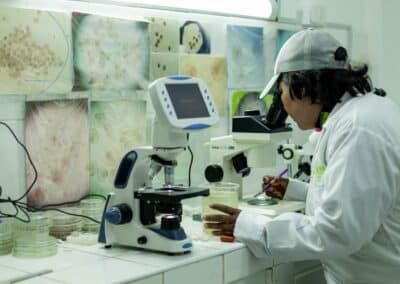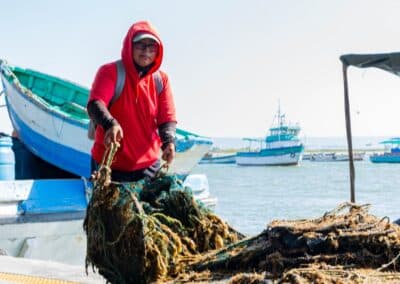In the Peruvian Bay of Sechura (Department of Piura), the aquaculture activity around the fan shell is a widespread practice that has a high socioeconomic and environmental impact on the population of this coastal area.
Since the beginning of 2023, we have been working on the development of an innovative project that aims to implement a circular economy approach to interrelate the activities of the aquaculture and farming sectors in Sechura. Thus, in collaboration with ESCAES and with funding from AECID, we are carrying out this initiative aimed at strengthening and completing the value chain of the fan shell, ensuring its environmental and socioeconomic sustainability.
From the sea to the field, this project integrates a series of actions ranging from the safe cultivation of fan shells at the bottom of the sea, to the use of the waste generated during the subsequent production process. In this way, it is hoped to reduce pollution levels and obtain valid nutrients to be used as fertilizer for the cocoa crops in the area.
An opportunity for Grilia Maribel
Mariculturists, Andean farmers and cocoa producers in Sechura are receiving training, materials and support as part of this project to improve the productivity of the fan shell, while combating climate change and protecting the native ecosystems of this area.
Grilia Maribel Quispe is a mariculturist and her participation in this initiative is allowing her to grow professionally and personally. “Before, my life as a woman in the community was limited. I only dedicated myself to housework, depending economically on my father or husband,” she explains. Participating in this project has been a great opportunity for Grilia, as she has now become a professional expert in the world of fan shell cultivation, an area that “I was completely unaware of before”.
Part of Grilia’s work takes place directly at sea, but she also spends part of her time at the ESCAES laboratory, where she analyzes seawater samples from farming areas. “The improvements I have experienced by participating in this project are innumerable” she says with joy.” “I have had the opportunity to learn everything related to the management of fan conch culture, sanitary norms, and environmental and biological monitoring. Now I can identify fan conch larvae in the laboratory, which allows us to install our seed collectors and use our GPS systems and the oximeter,” she adds.
Overall, Grilia believes that her participation in this project also has a very positive impact on her community and her family. Not only because it allows her to grow as a person and a professional, but also because it allows her to contribute to the economic and environmental sustainability of her community.








